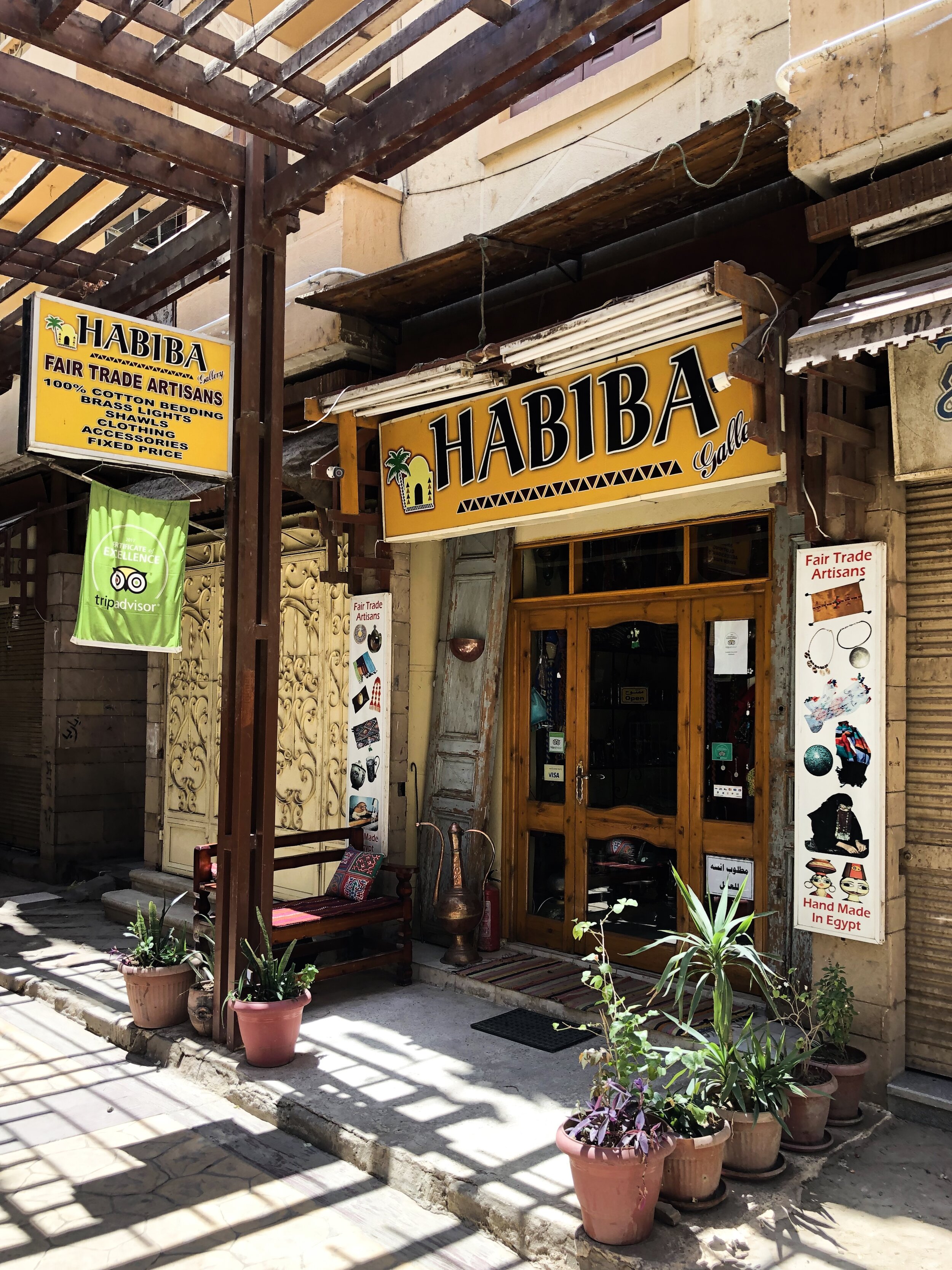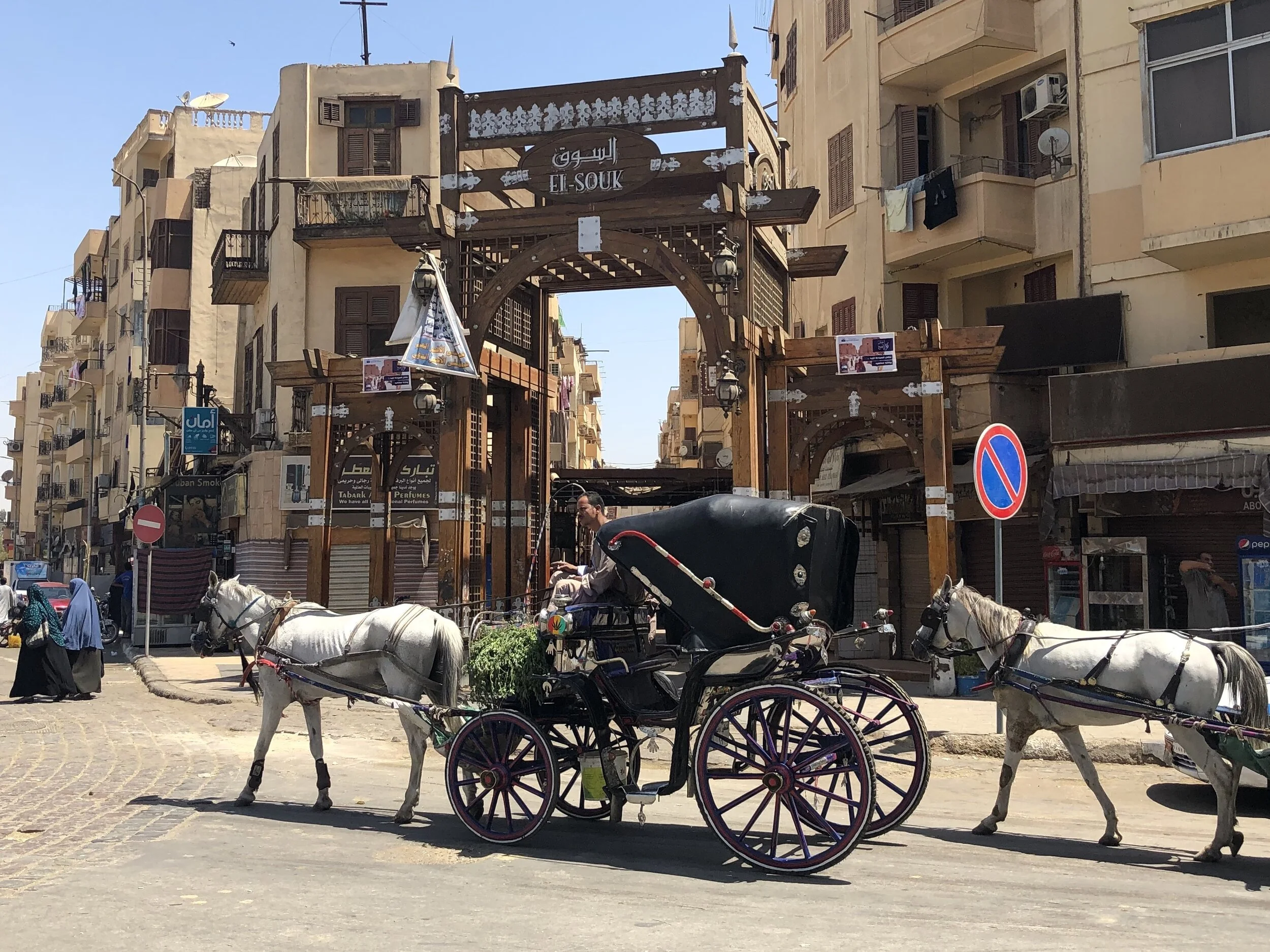This charming shop in the Luxor souk sells gorgeous items made by local women’s collectives.
If you’re staying in Luxor, be sure to stop into Habiba Gallery to pick up some local handicrafts — and say hi to Linda, who owns the shop.
Wally and I have never met a souk we didn’t like. As our time in Luxor neared its end, we made arrangements with the concierge at our amazing hotel, Al Moudira, to take us across the Nile to shop for souvenirs.
We arrived about 20 minutes later, outside the atmospheric pavilion that serves as the tourist market of Luxor. You’ll know you’re there when you see the massive louvered wooden pergola flanked by a pair of smaller pergolas and the name El-Souk emblazoned above the entrance. For a moment I felt like we were stepping into the city’s past as horse-drawn carriages trotted by while I was taking a photo.
“The shelves of Habiba are lovingly stocked with curated goods that represent the vast array of Egypt’s cultural richness and craft heritage.
Local producers, many of them women, are supported through the principles of fair trade, providing a path to economic self-sufficiency. ”
Beneath the latticework archway lies the entrance to the Luxor souk — just be careful of the horse and carriages.
Inside the pedestrian-friendly bazaar are merchants selling spices and shops selling scarves, djellabas, trinkets, alabaster, statuettes and more. It wasn’t exactly bustling — we were there on a Sunday, and as Luxor has a large Coptic Christian population, many stalls were closed — but that was fine by me.
After haggling at a few stalls in the market, our eyes lit up when we spotted Habiba Gallery, located on Andrawes Pasha, a side street running off the main souk. Wally and I have always had a passion for handicrafts, and the shop came highly recommended by Zeina Aboukheir, the “boss lady” proprietor of Al Moudira.
A playful textile depicting village life, including a watermelon vendor and colorful birds in a cage
UnCommon Threads: Every item Has A Story
As we excitedly began to collect items we wanted to buy, Linda Wheeler, an Australian expat and the owner of Habiba Gallery, began sharing the stories behind the pieces. One of the first of many to catch our eye were a group of earthenware pottery. It was difficult to choose between the unique handmade pieces, but ultimately we settled upon a couple of plates, and a serving vessel in the shape of a cow.
Duke and Wally couldn’t resist this dish shaped like a cow — at least they think it’s shaped like a cow.
Linda explained to us that the handmade pottery came from Tunis, a small village located in the Fayoum Oasis. The pieces were made by the former students of Swiss-born ceramicist Evelyne Porret. In 1989, Evelyne and her husband, Michel, established a pottery school to mentor and nurture the talents of the children of Tunis. Like Linda, Evelyne and Michel laid the foundation for locals to embrace an entrepreneurial spirit, and many of their students now run small businesses of their own.
Fun natural patterns adorn the plates we bought. The prices at Habiba are fair — no haggling necessary!
The next item was a supersized, Egyptian cotton hammam towel or blanket from Naquadah, a predominantly Coptic village located on the West Bank of the Nile River just south of Luxor. The fine textiles are woven by the local women, who have preserved the traditional craft of manual looming — practiced there since pharaonic times.
Linda told us how her conversations with the producer of these textiles eventually led to the subtle variation in style we saw before us. We chose one with a simple deep blue striped pattern and hand-knotted fringe.
This was quickly followed by a brightly colored embroidered textile with a whimsical scene depicting village life and a tote bag with a block-printed fly pattern. No one can deny a fly’s persistence, and the Ancient Egyptians viewed this trait as a positive attribute. Pharaohs were known to have presented military personnel with a golden fly amulet to acknowledge an individual’s success and tenacity. We now better understood the impressive necklace with three flies on it that we had seen at the Luxor Museum.
Wally regaled Linda with a story about how I was unable to exercise discipline when it came to negotiating — in fairness, I had caved rather easily at the shop we visited beforehand, but I was not going to leave Egypt without a few rather authentic-looking objects. Linda diplomatically replied, “Well, if you love them, then it was worth it. And if you think you’re getting a good deal, then that’s OK.”
The shelves of the shop are lovingly stocked with curated goods that represent the vast array of Egypt’s cultural richness and craft heritage. Local producers, many of them women, are supported through the principles of fair trade, providing a path to economic self-sufficiency.
Whimsical hand-painted wooden spindle dolls reminded Duke of Japanese kokeshi.
One of the refreshing things about Habiba is that everything is clearly marked, so there’s no need to ask for the price or haggle. Linda was never pushy and allowed us to peruse the shop at our own pace. After about 20 minutes, we had a large stack piled on the counter — quite a few things for ourselves as well as presents for family and friends.
Linda, an Aussie expat, started Habiba with a sewing machine and a dream. The shop now showcases gorgeous handicrafts made by women’s collectives in Egypt.
The Story of Habiba and Its Goal of Female Empowerment
It all started when Linda brought her trusty sewing machine with her to Luxor.
“The idea was to impart my simple skills and love of sewing onto the ladies in Karnak,” Linda says. “Some were widowed, divorced or illiterate, and I hoped to encourage them to make their own clothing. But this was a daunting task, so I reverted to beadwork, a traditional technique familiar to the women, and discovered they were happy to apply their skills to smaller items such as accessories.”
Wanting to find a way to improve these marginalized women’s livelihoods and provide them with a sustainable source of income, Linda decided to open a shop to sell their products. She chose Habiba, the Arabic word for “beloved,” and, with the help of Abd el Shafy, who assisted with the maze of bureaucracy, her dream came true.
Habiba is filled with beautiful handicrafts like these wooden boxes with geometric mother of pearl marquetry.
At first, the shop didn’t offer a large range of items. “I borrowed a black jalabiya and headscarf and set out with my friend Sahar to find additional handicrafts,” Linda says. “Being a traveller, the thought excited me, and what better reason to see the country and meet the local community? I’ve been to the Siwa Oasis, Sinai Peninsula, Western Desert, Aswan, Fayoum Oasis and El-Mahalla.”
She also partnered with Fair Trade Egypt. “I would travel to the source to see how the product was made and who was involved,” Linda explains. “Meaningful relationships were formed, and over time we’ve developed new ideas with them.”
Technology has improved communication and social customs have relaxed, so Linda no longer needs to modestly cover herself in native garb when she travels around Egypt.
Linda’s favourite site in Luxor is Karnak Temple. “I will walk through to the offering room, past those huge columns, and then on to the sanctuary of Sekhmet at the Temple of Ptah. It’s my place for grounding,” she says. So it’s fitting that she has helped to establish a workshop space in Karnak named Hands of Habiba, where the women are learning to become independent.
“For me, being a shop owner isn’t entirely about the money,” Linda says. “It’s about sharing the comments of our happy customers with the artisans. My life here has been about the women and the love and support that we give to each other. Living in Egypt is a simple life: buying local, living local and supporting local. The people make the experience — so friendly and always willing to give you their time.”
Her time in Luxor amongst the locals just might have influenced her, as we found Linda to be a delight. If you’re in this part of Egypt, be sure to stop into Habiba and purchase something (or some things) to take back with you, knowing that you’re helping empower Egyptian women. –Duke
“My life here has been about the women and the love and support that we give to each other.
Living in Egypt is a simple life: buying local, living local and supporting local. The people make the experience — so friendly and always willing to give you their time.”
Habiba Gallery
opposite the exit gate to Luxor Temple
Andrawes Pasha Street
Luxor, Egypt




























